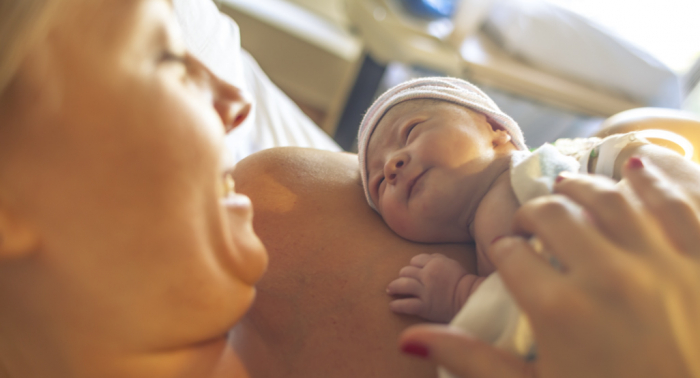When a baby is born prematurely, immediate skin-to-skin contact could save their lives.
Instead of placing low-weight newborns in an incubator, new research suggests they should be nestled up close to their mother's chest, or that of a close caregiver's, and fed exclusively on breast milk.
This approach, dubbed kangaroo care, has proved to be one of the best and safest ways to treat preterm infants with low birth weights, resulting in fewer infections, higher rates of breastfeeding, and better weight gain in studies.
Despite the growing number of benefits, the practice has not been widely adopted.
Currently, the World Health Organization recommends continuous kangaroo care for all preterm infants, but only after they are taken away and declared clinically stable in the neonatal intensive care unit (NICU).
A randomized controlled trial in five hospitals now suggests the WHO's recommendation separates babies and their mothers too soon. Instead, hospitals should implement a mother-infant care unit with beds and chairs so that hospital staff can look after new parents and babies at the same time.
The study was conducted among 3,211 low-weight infants in Ghana, India, Malawi, Nigeria, and Tanzania, who were either assigned immediate kangaroo care in a specially arranged "Mother-NICU" or were separated from the parents for conventional care, with brief moments of touch allowed after the first 24 hours.
In the first three days, infants who received immediate skin-to-skin contact were held for roughly 17 hours a day in the Mother-NICU. Meanwhile, those infants placed in incubators or radiant warmers received only 1.5 hours of intermittent daily contact.
Compared to conventional neonatal care, those infants who received immediate touch from their parents were 25 percent less likely to die in the first month of life.
Continuously held newborns were also less likely to develop hypothermia and bacterial blood poisoning, possibly because these infants had greater exposure to their mother's protective microbiome, were more likely to receive early breast milk, and were handled by fewer people.
Avoiding separation stress between the mother and the infant might also have contributed to greater health outcomes. Touch between a baby and its mother has been shown to stabilize the newborn's heart rate, calm its breathing, and decrease its crying.
"Keeping the mother and baby together right from birth, with zero separation, will revolutionize the way neonatal intensive care is practiced for babies born early or small," argues Rajiv Bahl, the Head of Maternal and Newborn Health Research and Development at WHO.
"This study illustrates that kangaroo mother care has the potential to save many more lives if it is started immediately after birth, a finding with relevance for countries of all income levels."
Today, over 96 percent of all infants with a low birth weight are born in developing countries, and these children are particularly vulnerable to infectious disease, developmental delays, and death.
Conventional neonatal care is expensive and requires great skill and logistical support, which many countries with lower incomes cannot afford. Kangaroo care, on the other hand, is a safe and effective alternative much easier to implement.
The findings support a recent meta-analysis that found kangaroo care after clinical stabilization results in 40 percent lower infant mortality.
Yet, many premature babies don't make it to that stage. Studies reveal nearly 50 percent of neonatal deaths in a number of Asian and African nations occur within 24 hours of delivery, and 80 percent occur in the first week of life, which means many lives are being lost before kangaroo care can be initiated.
"The idea of giving skin-to-skin contact immediately after delivery to very small, unstable babies has encountered quite strong resistance, but about 75 percent of deaths occur before the infant has been judged sufficiently stable," explains Nils Bergman from the Karolinska Institutet in Sweden.
If low-weight infants receive immediate kangaroo care, the authors of the new study estimate it could save 150,000 underweight newborns each year.
WHO is currently in the process of reviewing its guidance on kangaroo care.
The study was published in NEJM.
More about: #newborn
















































